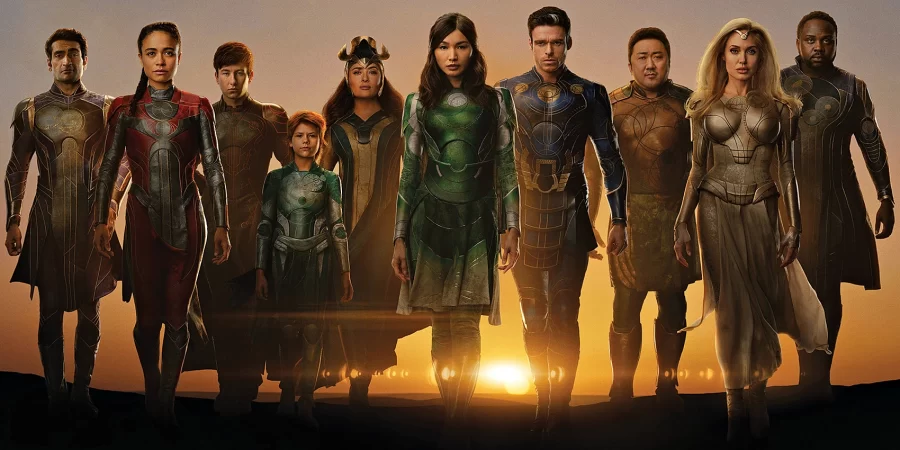‘Eternals’ fails to adhere to cohesive plot
December 10, 2021
Due to the pandemic, I have been trapped at home away from movie theaters. The last movie I remember watching in theaters was “Frozen 2,” released in November 2019. Despite the new concern of the omicron variant, I came out of my shell to see “Eternals” before it hit platforms for streaming.
It was not worth it.
Marvel Studios’ “Eternals,” directed by Chloe Zhao, features a diverse cast that reflects the diversity of their characters and the resulting fragmentation of plot. In one word, it’s a mess.
Because the film makes so many timeline jumps from the present to Mesopotamia, ancient Babylon, the Gupta Empire and Tenochtitlan, viewers are unable to piece together the true storyline until about two hours into this 2.5-hour slog. It turns out that the Prime Celestial Arishem is planning for the emergence of a new celestial to occur on Earth. He created the Deviants to destroy human predators, allowing for the human population to boom. But as the Deviants evolve, they become the new apex predators, so Arishem programmed the Eternals to keep the Deviants in check.
In those first two hours, viewers look forward to seeing Sersi develop into a mega-power, the Eternals to unite in their effort to stop the emergence, and Ikaris to live happily after with Sersi. Unfortunately, none of these occur.
Sersi’s journey of finding her true power is plagued by her insecurity as the chosen leader of the Eternals. Though she destroys a deviant in an underwater fight-or-flight sequence, Sprite almost kills her with a simple dagger. At her critical confrontation with Ikaris at the end of the film, it is Ikaris that caves into his feelings for Sersi rather than Sersi demonstrating her own strength. At the same time, Ikaris’ dilemma between remaining loyal to Arishem versus stopping Sersi is somehow unconvincing. It was truly surprising seeing Ikaris in tears, rather than wiping out Sersi with his laser eyes. Sersi deserved a compelling fight scene, perhaps with Timut or Arishem, where viewers could witness her full power. But perhaps that fight is just not in her, as her powers seem inherently defensive rather than combative.
At no point in the film did the Eternals seem united. The makeshift Uni-Mind maneuver seemed a last resort to end the film within 15 minutes. Viewers need a steady development toward unity involving concordance in values and incentives among the Eternals, all occurring earlier in the film. By building on the Darwinian allusions throughout the film, a more convincing resolution could have been collaboration between the Deviants and Eternals as both share the common goal of maintaining themselves in the universe.
Perhaps part of the reason the film dragged for 2.5 hours is simply because there are too many Eternals. Brevity and unity could be achieved by eliminating Makkari, who adds little to the storyline. The role of Karun is unclear as his documentary fails to come to fruition.
For most movies, the lingering thrill keeps me in my seat well into the credits. I left the theater as soon as “Eternals” concluded, disappointed that the ending with Arishema suggested a sequel. I will never get those 2.5 hours back, and I will not be crawling out of my shell for the next one.




























































